During a June interview in 2020, with Sandra Bernhard, André Leon Tally, a high-profile former Vogue editor said, “Dame Anna Wintour is a colonial broad… she’s part of an environment of colonialism. She is entitled and I do not think she will ever let anything get in the way of her white privilege.”
Why is this interesting right now? We chose André Leon Tally’s statement because it reflects an attitude that can be figuratively described as wokefishing.
“Wokefishing” is a new term that emerged in 2020. It was first used in an article by Vice’s Serena Smith. “‘Wokefishing’, put simply, is people masquerading as holding progressive political views to ensnare potential partners. A wokefish may at first present themselves as a protest-attending, sex-positive, anti-racist, intersectional feminist who drinks ethically sourced oat milk and has read the back catalogue of Audre Lorde, twice,” Smith tells Vice. The term describes someone who pretends to hold more progressive views than they really do.
The author of the wokefishing article points out that she first noticed this behaviour on dating apps where men for example would use #feminist in their bios but upon closer examination their treatment of women told a different story than their online dating profile. “Or, as is often the case, they are actively the opposite in their personal lives. It’s sort of like catfishing, but specifically with political beliefs,” she says.
This term has been changed a lot to suit the situation it’s referring to. Blackfishing, for example, is a popular derivative of this term. It describes a white person that is using tanning, make up, fashion and hairstyles to appear to be mixed with black. Wokefishing is trendy and it can be applied to other aspects as well.
The fashion game and its political views and values
Let us have a look at the fashion industry in Germany and mainly its opinion leaders. What has happened after the death of George Floyd? On the 25th of May 2020, George Floyd was murdered by police violence in Minneapolis, in the US state of Minnesota. His death triggered a global Black Lives Matter movement. This led so far that, even in Germany, the debate on institutional and structural racism has now also been opened. What does this mean for the fashion scene?
A deep look into the editorial offices, fashion institutions, universities and fashion companies in Germany shows that there is a lack of diversity, inclusion and representation. In December, we were surprised by the news that Christiane Arp, the editor-in-chief of German Vogue had resigned. Well this is an opportunity to make a difference in fashion by filling the position with Black, Indigenous, People of Colour (BIPOC).
Let’s be honest, the fashion industry is shaped by the western perspective and its authority of interpretation. This norm has existed and been perpetuated globally for decades without ever being questioned. It is high time though, that we critically question the system and structures that set the conditions for the international fashion industry.
What beliefs and values is this industry built on? It is a system that was built on the exploitation and oppression of Black people. A brief excursion into colonial times is needed at this point. During colonialism, Black people were a cheap labour force in the cotton fields and, as such, they were oppressed and dehumanised. The continent of Africa was robbed of its raw materials, gold, diamonds alongside a variety of other vital resources. This goes hand in hand with the prosperity of the Global North.
Elie Kuame
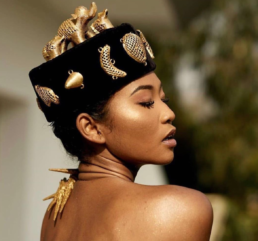
Cedric Mizero
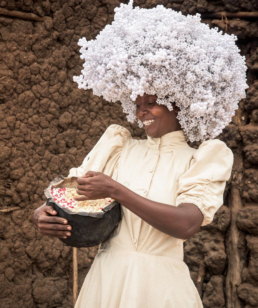
I am concerned with the inexorable exploitation of raw materials and labour up to today. The greed for profit of the Global North and the subsequent dependence of the Global South lead to inhumane conditions along the fashion supply chain. It is an unbalanced, unhealthy and corrupt basis that needs to be broken up. The economic powers must be rebalanced to eradicate global neo coloniality.
The tragic death of George Floyd and the subsequent protests have finally led some German fashion companies to reflect on their corporate philosophy to date, raising some questions concerning their corporate culture. How diverse are we? How inclusive are we? Some companies have already found a „solution“ that is ideal for them: the use of Blackness. In short, more black models in campaigns, so that the fashion company looks beautifully diverse when in fact it was not so interested in appearing to be such years ago. Following this, a few designers of African origin have been featured in magazines with the addition “Black Owned Brand” and there has been more social media content with BIPOC. Lest we forget ‘tokenism’ to appease the black quota, a symbolic figure to ensure enough diversity in the company by their existence.
But it’s not that simple. It is finally time to get to the root of the fashion industry constructs and deconstruct it.
Wokefishing vs. Fashion activism
If this fashion industry really wants to tap into a new reality, it needs more than sustainable fashion concepts or individuals with alibis. In this context, companies like to claim sustainability, but what does that mean in concrete terms? It is not enough to produce fabrics and collections under partial socio-ecological standards. It takes much more, it takes an admission that farmers who produce cotton are paid fairly, that industrial parks in African countries pay their employees fairly, that decision-makers in purchasing, marketing and sales are sensitised to buy collections from BIPOC; and that representatives of BIPOC sit in relevant lead positions.
The fashion industry needs to explore business models rooted in circularity and longevity. It needs to go further and it needs to be deconstructed down to the smallest individual parts, so that something new can develop. How the international fashion industry defines sustainability does not relate to how sustainability is defined in Africa. It is time to rethink and restructure old thought patterns. The African fashion industry has been playing out in the slow fashion market, where the environment, producers and consumers have always been the focus. The sustainability movement is characterised by the traditional 4 Rs (Reduce, Reuse, Recycle and Rot). The movement in Africa, on the other hand, has embraced a holistic understanding of sustainability – Redefine, Reclaim, Reimagine and Revolutionise. In order to implement this movement, it requires the expertise of BIPOC in all aspects.
Wokefishing in fashion?
In the fashion industry there is a lack of diverse perspectives. When BIPOC or African expertise comes into play, then unfortunately it is often diverted back to a phenomenon that could then be called wokefishing.
An example of wokefishing in fashion would be Myself Germany Magazine: In their June 2017 edition they highlighted African Styles, unfortunately no African or diasporic fashion brand was mentioned. The term, “African Styles”, was only used to describe the theme of the month and to highlight western brands who help themselves to African aesthetics and unabashedly use it for cultural appropriation. Obviously, it was not the intention of the magazine to present brands or designers of African heritage. We, that is, the collective of Fashion Africa Now, called them out on social media and have not received a response up to today.
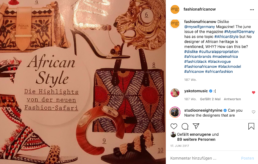
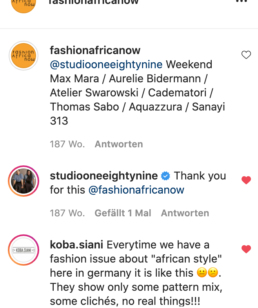
Another example would be Elle Germany: In their November 2019 issue, the magazine was meant to celebrate Black models. It featured a white model on the cover and the issue was titled “Back to Black – Black is back again – irresistibly”. Within the pages of the magazine, two black models were misidentified. Joan Smalls, an globally established top model, who has been in the industry for nearly a decade, was presented as a newcomer. The internet reacted immediately as Elle made it look as if Blackness was a trend that had only now just come back. The scandal drew international attention with industry icons like Naomi Campell posting their disappointment to see a major fashion publication put out something so unthoughtful.

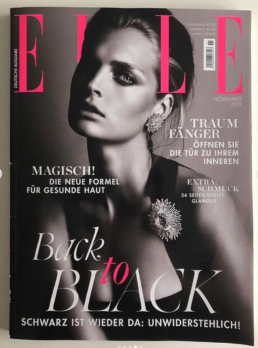
During the BLM protests many brands posted black squares on their social media accounts in accordance with the blackout Tuesday hashtag. Whilst this was invented by the music industry, it had also an impact on the fashion industry. What has happened so far in the fashion industry in Germany? As far as we know, an e-commerce retailer is looking into on-boarding brands from designers of African heritage. It is a process, we are trying to make it happen, stay tuned. We know that a well known high end luxury concept store would like to include African brands. Apart from them, they’re are individual concept stores that stock brands. In the past, the KadeWe group stocked brands Black designers. It is not enough to stock one to five brands. It needs more to make things change, and it is possible when there is true acknowledgement of operating in a racist system.
The expertise of Fashion Africa Now lies in African fashion; we have started the movement in Germany and have been actively introducing brands like Adama Paris or Maxhosa to the German fashion landscape. Our activism started in 2012, at a time when there was little interest or acknowledgement of „Made in Africa“ and contemporary African fashion. In fact, it was still mistaken for Ethno fashion. Today it is somehow perceived and still not yet acknowledged. In the past we heard a lot about the new pledge of improvement and promises of diversity, inclusion and representation that we became familiar with over recent years. Few actually realised that the first step to being anti-racist is to analyse their own behaviour and workforce.
A surprising admission of guilt came from Vogue’s Anna Wintour who admitted that under her leadership Vogue had failed to give Black creatives a space. This statement was not well received; many noted that she had been at the head of the fashion industry for decades and seemed content with its focus on (mostly) thin, white women until she was called out for it. She was accused of wokefishing, because she did not join a race and racism meeting that took place at the same time she made the statement.
Reflection and Circular Economy
The wealth of knowledge from BIPOC, however, is indispensable in the process of exercising diversity, inclusiveness and representation. The actors, critical thinkers and activists who practise alternative or new business models should be taken seriously. It is time for circular fashion and awareness for the environmental impact of the clothing industry. The international fashion industry has to admit that change can only happen with a rejection of hegemony. Specifically, the inclusion of BIPOC in relevant leadership positions and the acceptance of new solutions from non-Western perspectives.
The process involves critical engagement and reflection. Reflection can only succeed if there is insight and a serious will for positive change. “Ignorance cannot be an excuse, but must trigger a serious debate and a learning process, otherwise we will not get anywhere as a community.” A quote by Dr. Mahret Ifeoma Kupka, fashion curator Museum Angewandte Kunst in Frankfurt, Main. (Source, German Vogue 2020)
German original
Die Unwissenheit kann keine Entschuldigung sein, sondern muss eine ernsthafte Auseinandersetzung und einen Lernprozess anstoßen, sonst kommen wir als Gemeinschaft nicht weiter. Dr. Mahret Ifeoma Kupka, Kuratorin am Museum Angewandte Kunst in Frankfurt am Main (Quelle, Deutsche Vogue 2020)
Overall wokefishing seems to be a product of the idea that one can simply pretend to go with the times. Social Media enabled individuals and brands to create personas and these personas can be woke without actually contributing anything to a movement. It is very much surface level participation to post an infographic and then continue going on as usual. In the aspect for people who work in fashion the danger is that they are capitalising on movements and communities that they are not really supporting. The actual work should be activism, it is not enough to hide behind a company. The time for change is now and change can only be reached by looking into the issues and confronting them. There are platforms in Germany that do good work with few resources, and Fashion Changers is one of them.
How to start?
- Connect with individuals or platforms in your country who have the expertise and a network to bring new solutions to the table that lead to lasting change
- Hire BIPOC experts in leadership positions and trust their skills
- Stop controlling the narrative. It is time to change it, share it and allow black voices to add their experience to the conversation
- Let us create new concepts together
Photo Credit / Cover Image
Designer Maxivive
Creative direction & Styling by Gavin Mikey Collins @gavinmikeycollins
Photography by Theodore Afrika @theodoreafrika
Modeled by Tessa Cloete & Jay Jay Bewa @tessacloete @jaybewa_
Photo Credits: Ellie Kuame, Cedric Mizero, Felix Gyamfi



